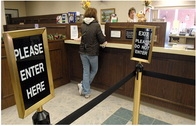Advertisement
FDIC adopts final rule imposing a special assessment on insured depository institutions

The Board of Directors of the Federal Deposit Insurance Corporation has voted to levy a special assessment on insured institutions as part of the agency's efforts to rebuild the Deposit Insurance Fund (DIF) and help maintain public confidence in the banking system. The final rule establishes a special assessment of five basis points on each FDIC-insured depository institution's assets, minus its Tier 1 capital, as of June 30, 2009. The special assessment will be collected Sept. 30, 2009.
"Assessments are a significant expense, particularly during a financial crisis and recession when bank earnings are under pressure," said FDIC Chairman Sheila C. Bair. "We recognize that assessments reduce the funds that banks can lend in their communities to help revitalize the economy. On the other hand, deposit insurance provides a benefit for which banks have always paid. And backed by deposit insurance, deposit funding costs have fallen significantly, approaching historic lows. Indeed, the unique ability of banks to access low-cost, government-backed deposits has contributed to the recent increased profitability of many banks. For these reasons, we have tried to strike the right balance between keeping the assessment low enough so that it does not unduly burden lending capacity with our longstanding commitment to cover all projected costs through industry assessments, not taxpayer borrowing."
With the special assessment adopted today, the FDIC projects that the DIF will remain low but positive through 2009 and then begin to rise in 2010. However, Chairman Bair also cautioned that given the inherent uncertainty in these projections and the importance of maintaining a positive fund balance and reserve ratio, "it is probable that an additional special assessment will be necessary in the fourth quarter, although the amount of such a special assessment is uncertain." Chairman Bair also stressed that FDIC-insured institutions "should not be penalized for getting us through" the current financial crisis. For that reason, she said the FDIC will be instructing its examiners to ensure that they will not downgrade an institution's supervisory CAMELS ratings because of the effect of the special assessment.
The special assessment will be assessed against assets minus Tier 1 capital rather than domestic deposits, but the assessment will be capped at 10 basis points of an institution's domestic deposits so that no institution would pay an amount higher than they would have paid under the interim rule. "This hybrid approach -- using assets minus Tier 1 capital as the assessment base but with a cap based on domestic deposits -- will shift the allocation of the special assessment somewhat towards banks that rely more on non-deposit funding, which large banks tend to do," Chairman Bair explained. She added, "Congress has clearly left to the FDIC the ability to define our assessment base. And we specifically requested -- and received -- comment on the issue of whether assets should be used for the special assessment. After careful consideration of competing views, I believe today's rule is equitable and provides the appropriate balancing of competing interests" in terms of fairness to all insured institutions.
For more information, visit www.fdic.gov.
About the author





